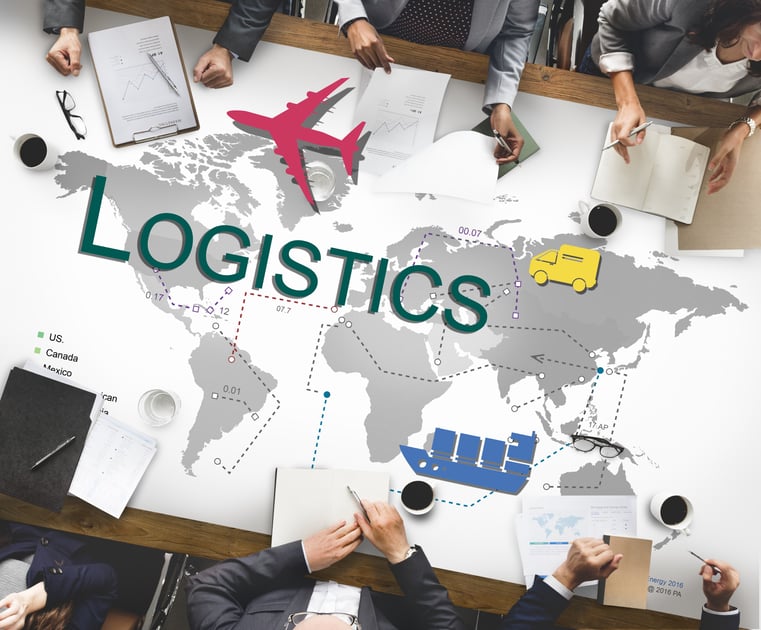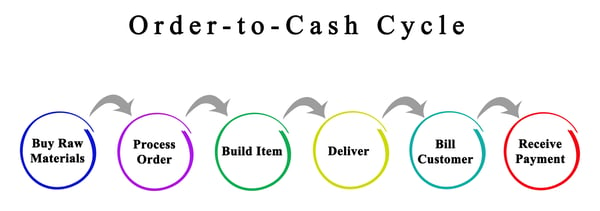
Today’s complex supply chain has companies operating in highly competitive markets - meeting customers where they are in their buying requirements. And it's elevated the need for businesses to employ the best possible logistics and supply chain strategies to get out of the daily firefighting of tracking, tracing and recovering inbound and outbound shipments. But getting to that essential market position takes time, talent and resources many companies do not have.
With that said, companies of all sizes have taken the plunge into outsourcing their logistics team. Fortune 500 companies were the first to go down this path of using third-party logistics companies (3PLs), as cited by the annual third-party logistics study published by Armstrong and Associates. As more learn the benefits of a freight management service solution offered by third party logistics companies, it is coming with resistance from some smaller to mid-sized companies.
After having worked with many companies on their buying journey, we have boiled down the resistance to be associated with the logistics manager’s concern of losing their job. While this concern should not be part of the decision process, it is easily understood for two driving reasons: logistics departments of mid-sized companies are composed of one to five people and outsourcing often translates to job loss.
As it relates to freight management, outsourcing your freight and logistics does not put you out of a job, it does however change your job from a firefighter to a planner, strategic thinker and advocate of your company’s growth through credit logistics and supply chain execution.
To understand the change in your job, remind yourself of the critical nature of the logistics and supply chain function in your company, which is the functional area has to be proficient in delivering freight on time to the right destination, in the right quantity, damage-free, efficiently, report on it and at the lowest possible cost, has always been critically important to businesses.
This is not an easy task and the complexity often gets lost in the granularity one can find themselves in during the day of recovering one critical order that did not go as planned. So, by outsourcing the "issue of the day" to a third party logistics company, the internal company logistics team leadership can finally get to the issues the various functional departments and C-suite executives want, which is more proactive work, better integration between internal systems and all major external business stakeholders (customers & vendors) and engaged in building a resilient competitive advantage for the company through supply chain excellence.
Taking it one step further, while your company is focused on “building the better mousetrap” to be competitive in the somewhat finite market it serves, the logistics department is competing against any number of shippers for price, capacity and service making the challenge almost infinite in nature.
Add to the infinite number of freight competitors is the market cyclicality and challenges that come from outside forces that are often not understood by those that do not live and breathe freight on a daily basis. Examples of outside forces include: natural weather disasters coming from polar vortex, hurricanes and floods; COVID19 global pandemic; economic demand; trade wars; port labor strikes, etc., etc., etc.
Keep in mind there are other reasons that a freight management solution is brought in, which is outlined below:
 Service KPIs Suffering
Service KPIs Suffering- New Technology Required
- Increasing Logistics Costs
- Operating
- Freight Cost
- Project or Seasonal Volume Spikes that Cannot be Managed Internally
- Continuous Growth that Becomes Harder to Support Internally
- Business Model Changes
- Geographical Changes
- Business Matures
- Change in Key Personnel
- Launching a New Service or Product within the Business
- Want to Manage Inbound Freight for Cost and Process Flow in Combination with Outbound Freight Flows
The above highlights the challenges companies are often confronted with as it relates to their logistics and supply chain groups that require a quick change in direction to remain competitive, but again a freight management service solution does not mean loss of job but solidification in accomplishing the above goals through a transportation management program.
Freight Management Solutions Change Functional Direction of a Company’s Logistics Team
 So, with the background behind us the below list outlines where the logistics leadership changes functionally when a freight management service solution is brought to your company:
So, with the background behind us the below list outlines where the logistics leadership changes functionally when a freight management service solution is brought to your company:
- Move from daily execution challenges to strategic planning and execution
- Make data driven changes for better service at less cost
- Evaluate distribution strategy & network
- Work the market for better motor carrier strategic alliances
- Tighten delivery windows for leaner inventories
- Establish internal and external communication channels for all stakeholders that require information on shipments
- Integrate supply chain technology further into customers to establish a link that would be highly valuable and difficult to cause vendor to move on price alone
- Establish process to further improve the order-to-cash cycle of you company
- Drive cost savings through the data
- Freight cost
- Claims management
- Charge-back mitigation
- Work across functional areas for KPI improvement required through collaboration
- Forecasting for success versus holding onto one’s desk for what will be the next market shoe to drop or the company pundit who says it is time to cut the freight budget in a capacity constrained market.
The above changes enable the company’s logistics team to spend less time on menial tasks and more time on what matters most, like building relationships with customers and carriers and solving complex problems.
These higher level tasks are what changes the logistics department focus versus having them lose their job. As part of every freight management ROI analysis there is a component of administrative cost savings, which is people costs so we cannot say 100% of the jobs will be kept. Those people that get reassigned as a result of a freight management solution are the firefighters and whatever daily execution people may not be needed for the “higher logistics cause”. These reassigned people are invaluable to the organization, as their knowledge of the supply chain mechanics make them critical resources others would love to add to their team, so these people too are still employable within the company outsourcing to one of the top freight management 3PLs.
Smaller companies and very lean mid-sized companies may see little to no change in their team size because they will be leading the charge on building the new competencies within its logistics and supply chains.
For more specifics on the new direction of the logistics team we break down, by functional area, how they will be redirected to change the vision from a cost center to building the company’s competitive advantage.
Logistics Professional Team Interaction with Functional Areas Transformed by a Freight Management Program
 To add to the idea that employing a freight management program with a 3PL does not outsource one’s job, let’s take a look at how the relationship of the logistics leadership changes with the functional areas within a company.
To add to the idea that employing a freight management program with a 3PL does not outsource one’s job, let’s take a look at how the relationship of the logistics leadership changes with the functional areas within a company.
At the heart of a freight management solution is technology that interfaces between a company’s internal and external systems to bring transparency to their supply chain. This alone is a game changer for many companies, but with the additional connections a top TMS system has with other logistics and supply chain technology and databases brings together systems and technology that would take a company and its internal logistics department years and hundreds of thousands of dollars.
As we tell mid-sized companies the essence of a freight management program is a 3PL is selling its business plan they have been executing to grow their business profitably in a highly competitive market to shippers. The 3PL, or as some call them logistics service providers (LSPs), takes its people, knowledge, technology and proven processes and operates a shipper’s entire supply chain with their “franchise” model.
With the improvement in technology and the resources to take away the day-to-day issues that bog down the logistics department, while capturing invaluable data that will exponentially improve the way a company’s supply chain operates give the internal logistics team all the room required to address all the areas the internal functional teams want to take the company but could never get there because of the lack of information and resources.
With that in mind, let’s look at each functional area and address where the logistics management team will be putting its focus once the freight management service solution is up and running.
Accounting & Finance
 As the business grows, so does the transportation budget.
As the business grows, so does the transportation budget.
The freight management logistics partner leverages the best-in-class in TMS technology, people, knowledge, network and proven process to deliver an ROI within months, but that is just the start to drive down freight costs.
The freight management 3PL will deliver the analysis that a company’s finance team is typically reporting on each month, but missing the key components of what is driving the cost variations to make meaningful change.
Once the freight management program has been set in place, the logistics leadership will be producing the freight cost analysis at a more detailed level that they will also be communicating on the actions being taken to improve future results.
In addition to the freight cost analysis and after the initial investment has been made, the freight management program will drive even higher analysis on reporting and analyzing freight movement throughout the supply chain to impact purchasing decisions, manufacturing sites and distribution center alignment to optimize the flow of goods to improve the company’s order-to-cash cycle.

Adding to the value and critical connection the logistics team needs to have with its financial team also includes the freight audit and pay functions. Within the core services of a freight management solution is freight audit and pay. The accounting team will want to be in the mix here with coding, reporting and working the weekly summary invoice that they will be paying to the freight management company, so the freight management finance group can pay the individual carriers in the logistics program.
Last but certainly not least is cost analysis against internal goals, but also against the billions of dollars of freight spend data the third party logistics team has at its fingertips to analyze and report on the program. The market data and performance the freight management program has will drive the initial RFP process to negotiate for the lowest prices and best service that is part of the onboarding process, but is also included within the monthly reporting package.
All said, the financial team will be inundated with data for its company’s freight and logistics cost performance through the freight management program that will need to be coordinated through its internal logistics team for issuing the state of the business, then sharing what actions are being taken to improve the future.
Sales & Marketing
 Sales is all about generating new and different revenue streams to increase their company’s stickiness with customers and increase market share.
Sales is all about generating new and different revenue streams to increase their company’s stickiness with customers and increase market share.
The last conversation any sales person wants is to take calls and track down an order that was sold, but not delivered making in-stock backorders the measurement they never want to worry about and that is where a professional freight management company excels.
Through its systems and people a logistics company’s freight management program will efficiently and effectively move products through the sales channels and provide accurate reporting on the order from pick-up to final delivery.
Add to the discussion for sales & marketing is the stickiness and value add that can come through the technology of pushing and pulling not only orders, but expected delivery times and full visibility of the order from manufacturing through to the final distribution.
With this new level of technology and service coming through the logistics team there will be plenty to be done to make these connections with the customers and coordinate the interfaces and strong project management to see them through to completion.
Manufacturing & Distribution
 A whole new level of interaction will also be coming out of a company’s manufacturing and distribution group. The theme is similar to what is found on the sales and marketing side of the business, which is the technology will bring transparency to what has been a somewhat opaque supply chain.
A whole new level of interaction will also be coming out of a company’s manufacturing and distribution group. The theme is similar to what is found on the sales and marketing side of the business, which is the technology will bring transparency to what has been a somewhat opaque supply chain.
Here again interfacing will bring a new level of stickiness with vendors; help companies better understand the flow of goods so to have the resources and facilities aligned when the product hits the docks; and bring a coordination that changes the interaction between manufacturing, distribution and the logistics teams.
Purchasing
With purchasing being closely aligned with the manufacturing and distribution departments, they too will be able to look upon its logistics team for better interfacing and understanding of the costs and service their vendors are contributing; review purchasing contracts for freight implications of landed versus managed internal; and put vendor management reporting into place with an inbound freight management program.
Conclusion of Why You Should Not Worry About Losing Your Job by Outsourcing the Freight & Logistics Department
 The long and short of this conversation is the internal logistics team moves its expertise from day-to-day operations to a tactical and strategy function.
The long and short of this conversation is the internal logistics team moves its expertise from day-to-day operations to a tactical and strategy function.
Now here comes the caveat. Not everyone that is well suited for daily operational challenges and firefighting the problem of the day has the tools to be a tactical engineer, a strategic thinker and a coordinator or activities among the various departments of their company. In those cases, yes there could be a job change on the horizon when a freight management solution is brought to a company.
However, for those logistics teams that have never been able to get out of challenge of the day to get to the higher level supply chain management work that will move a company’s freight department from a cost center to a competitive tool and forever change the company, then a freight management service solution from a 3PL is for them. The freight management third party logistics company will take the daily pressures off the logistics team; provide the technology and information that drives change; and keep service and cost management to the tactical and strategic level to make heroes of the management team that brought them to the company and cement them into the keystone of their organization.
So to close out this conversation the level a freight management company brings efficiencies to a company’s supply chain to operate with leaner inventories, just-in-time manufacturing, tighter delivery windows, omni channel distribution strategy and higher consumer fulfillment expectations driven by ecommerce, while driving down operating costs in what continues to be very difficult freight markets.
So, if you are still interested in learning more we recommend the following articles:
- Why Shippers Select Managed Transportation Service (Benefits & ROI Calculation Model)
- The Comprehensive Guide on Managed Transportation Services
- The Complete Guide to Freight Management Service Solutions
- How Much Does Managed Transportation Cost? A Comprehensive Guide
- 2020 Best Managed Transportation Companies (And How to Choose)
- Freight Costs: An Insider’s Look on Freight Pricing Buyers Should Know
- Best Transportation Management System (TMS) Software Packages
- Comparison between Freight Broker and Managed Transportation Services Freight Operation Models
If you're ready to take the next step, at InTek Freight & Logistics, we can help. Just tell us what you need and we'll discuss how our expertise can help with the unique shipping challenges your business faces. Rather do a bit more research first? View our Freight Guides for comprehensive articles and eBooks on all things freight and logistics.
Get Updates
Categories
- Freight & Shipping Costs (54)
- Freight Broker (60)
- Freight Forwarder (2)
- Intermodal Transportation (184)
- International & Cross Border Logistics (43)
- Logistics & Supply Chain (420)
- Logistics Service Provider (77)
- LTL (39)
- Managed TMS (49)
- News (39)
- Supply Chain Sustainability (12)
- Transportation Management System (37)
- Truckload (122)
- Warehousing & Distribution (50)



